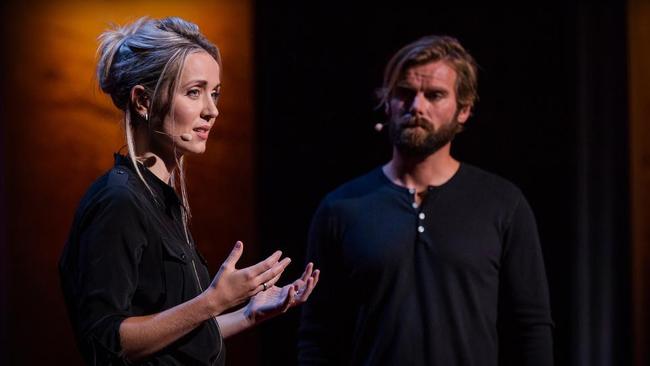Victim Thordis Elva and rapist Tom Stranger explore heart of darkness
South of Forgiveness sees a rapist and his victim confronted with personal demons in a quest for closure.

“What people find really hard to bear,’’ Helen Garner said in a 2015 speech on writing about the murder of children, “is the suggestion that they themselves might contain their share of human darkness, hidden inside their souls.’’
When an act of violence is committed, our instinct is to dehumanise the perpetrator; they become a ‘‘monster’’. When a woman is raped, we ask: Why did she walk home alone? Why did she drink so much? Why did she make herself vulnerable to the monster’s attack? Garner calls this grasping for responsibility a ‘‘shield against darkness’’; a psychological defence. But these ‘‘whys’’ place blame on the victim.
Thordis Elva’s South of Forgiveness is not a typical memoir of trauma, survival and justice. It ventures into confronting territories, and may prove too raw for some readers.
Addressing social narratives about assault, the Icelandic writer was taught that girls get raped for a reason — their skirt length, their drunkenness — and that sexual assault is committed in dark alleyways by psychopaths.
‘‘I, like millions of other girls, was taught from an early age how dangerous it is simply to be a girl,’’ she writes. ‘‘[But] most rapes don’t take place in the circumstances we’re meant to avoid. Most of them take place in the privacy of our homes, and are carried out by people we’re supposed to trust.’’
In 1996, she fell in love with an Australian exchange student, Tom Stranger, when he attended her Reykjavik high school. Their teenage romance darkened when she drank too much rum at a Christmas Ball, and Stranger took her, his girlfriend, home and raped her for two hours as she lay comatose on her bed. Before either of them came to terms with his act of violence, he returned to Australia. She never pressed charges.
After nine years of self-inflicted anger, Elva wrote a letter to Stranger, detailing her trauma. In reply, he confessed, and they began a dialogue that continued over email, grappling with the question: if he loved her, why did he rape her? Neither found closure. Sixteen years after the seemingly unforgivable act, South of Forgiveness finds them meeting in Cape Town, the middle point between both homelands.
In a book written with the simplicity of a travel narrative, the unlikely couple pour out their life stories in a search for healing. Their conversations take place at Cape Town’s waterfront and at restaurant tables.
South Africa is known as ‘‘the rape capital of the world’’, making it a pertinent location to discuss what led a young man to commit sexual assault. As well as this, Elva’s work as a speaker and activist means she is well-armed to discuss the structural inequalities that cause widespread misogyny.
Stranger is credited as co-author of the book, contributing diary entries to balance Elva’s narrative. His words are excruciatingly vulnerable: ‘‘I prepared to walk with her into that dark cave, knowing she would light up demons hiding in corners of myself ... The questions of ‘how’ and ‘why’ have echoed down to the depths of that cave and no answer has returned, no matter how loud I’ve screamed.’’
Beyond the why, Elva asks: can a survivor forgive? At its heart, this is a memoir of confronting fear and shame, and finding a way through trauma. Nelson Mandela’s legacy of restorative justice is clear as Elva seeks reconciliation, not revenge — and not a jail sentence.
South of Forgiveness reads like group therapy: deep pain is unearthed and examined like a jewel beneath a light. Crucially, Elva has the humility to claim she has the same capacity for darkness as Stranger, yet the privilege and power he is afforded as a man means he is more inclined to commit violence.
Stranger is articulate in his confessions, and relatable in his anguish. It compels the question: should we give a rapist a platform? Does his voice negate or overshadow the victim’s story (which we must uphold, many would argue, for her to be transformed to a survivor)? Should we minimise the perpetrators’ story in a society that prioritises aggressors over victims in many of its institutions?
‘‘Rape is a crisis of masculinity,’’ social historian Joanna Bourke writes in her polemic on the subject, Rape: A History from 1860 to the Present. ‘‘Its eradication is a matter for men.’’
By owning the label ‘‘rapist’’ and exploring his motivations, Stranger allows the mythical perpetrator to be demystified. The monstrous shadow is given meek human form, allowing men’s actions, not women’s, to be interrogated. And through her informed analysis of gender inequality, Elva reveals the social mechanisms that create male sexual entitlement.
‘‘Rape is mundane,’’ she writes, destroying the myth that all rapists lurk in alleyways, and piercing our common defence against darkness. South of Forgiveness illustrates that the rapist is not a monster; he is likely someone we know and trust. He is human.
Lou Heinrich is an Adelaide-based feminist writer and critic.
Thordis Elva and Tom Stranger discuss their book at various events in Australia during the next week.
Details: scribepublications.com.au/news-events/events.
South of Forgiveness
By Thordis Elva and Tom Stranger
Scribe, 320pp, $32.99


